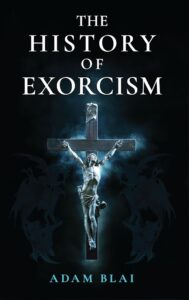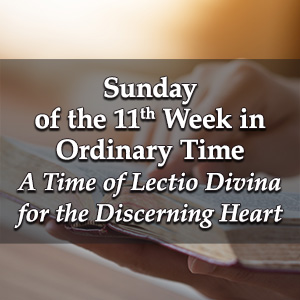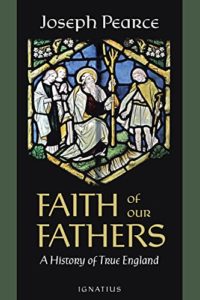Podcast: Play in new window | Download (Duration: 22:02 — 15.2MB) | Embed
Subscribe: Apple Podcasts | Spotify | Amazon Music | Android | Pandora | iHeartRadio | JioSaavn | Podchaser | Gaana | Podcast Index | Email | TuneIn | Deezer | Anghami | RSS | More

Adam Blai on “The History of Exorcism,” Part One – Inside the Pages with Kris McGregor
In Part 1 of this conversation, Adam Blai discusses with Kris McGregor the history and practice of exorcism. Adam Blai emphasizes the importance of understanding the context and history of exorcism to demystify misconceptions often perpetuated by media. He explains that exorcism has been a part of human history since ancient times and that it involves a range of prayers, with solemn exorcism being qualitatively different from deliverance prayers.
He shares his journey into this ministry, highlighting his background in psychology and how his curiosity about spiritual phenomena led him to work with exorcists. He clarifies that as a layperson, his role is to train and coach priests, not to perform exorcisms himself. The conversation covers the development of institutes like the Pope Leo XIII Institute, which train exorcists and their teams, emphasizing the need for proper order and protection in this ministry.
He touches on the use of Psalms in exorcism rituals, the distinction between possession and other forms of spiritual oppression, and the rigorous process required to determine if a solemn exorcism is necessary and of relying on documented signs of possession rather than subjective discernment to ensure the appropriate response and the crucial role of the bishop in granting permission for solemn exorcisms.
You can find the book here.
Discerning Hearts Reflection Questions
- Understanding the Historical Context of Exorcism How does knowing the history and context of exorcism help demystify common misconceptions about the practice?
- The Role of Exorcism in the Church In what ways does exorcism contribute to the spiritual life and mission of the Church, both historically and in contemporary practice?
- The Importance of Proper Training and Authority Why is it essential for exorcists to be properly trained and authorized by the Church? How does this safeguard the integrity of the ministry?
- The Distinction Between Solemn Exorcism and Deliverance Prayers What are the key differences between solemn exorcism and deliverance prayers, and why is it important to understand these distinctions?
- The Role of Scripture in Spiritual Warfare How does the use of Psalms and other Scripture passages in exorcism highlight the power of God’s word in combating evil?
- Personal and Community Protection in Spiritual Ministry What steps can laypeople and clergy take to ensure they are protected when involved in spiritual ministry, especially in deliverance and exorcism work?
- The Discernment Process in Identifying Possession How does the objective process of documenting signs of possession before requesting a solemn exorcism from the bishop reflect the Church’s careful approach to spiritual matters?
- The Balance Between Charismatic and Institutional Responses How can the Church maintain a balance between the charismatic expressions of faith and the structured, institutional responses to spiritual phenomena?
- Trusting in God’s Sovereignty Over Evil In what ways does recognizing Jesus’ ultimate authority over evil influence the approach to exorcism and deliverance ministry?
- Personal Reflection on Spiritual Readiness Reflect on your own spiritual practices and readiness. How can you ensure you are spiritually prepared to face challenges and assist others in spiritual battles?
“Due to the advancement of observable evil in our society, the topic of exorcism has increasingly come to the forefront in the West in this century. In Hollywood movies, exorcism has often been sensationalized and misconstrued. Although volumes have been written about demons and exorcism, little has been explained about what solemn exorcism really is within the larger context of deliverance ministry. But now, Church-decreed expert on demonology and exorcism Adam Blai thoroughly explores the roots of exorcism and breaks open its significance for you.
You will find answers to wide-ranging questions such as: Is possession an exclusively Christian phenomenon, or is it a universal problem? Did exorcism exist before Jesus, or did He introduce it? If it predated Christianity, how did other cultures see it and deal with it? How do other world religions view the phenomenon of possession and exorcism? Are there other methods of confronting it besides the Catholic rite?
Blai lays out how exorcisms were performed in the earliest days of the Church. Over time, a liturgical rite was developed and teachings were provided to safeguard the faithful in the practice of exorcisms.
In these pages, Blai reveals:
- Twenty-one guidelines for exorcists, produced under St. Charles Borromeo
- Fascinating examples of actual exorcisms (some made famous in movies!)
- Astounding examples of how saints helped drive out demons (even from the great beyond!)
- Which psalm is known for offering protection and deliverance from evil spirits (Can you guess?)
- The revolutionary way in which Jesus performed exorcisms
You will learn about how a harpist helped deliver King Saul of an evil spirit and how the spirits of giants tormented people. As you read about the evolution of exorcism, you will observe how strange practices sometimes occurred through the use of magic and superstition. You will also find five exorcism guidelines from the Middle Ages and four signs of genuine possession today.
Additionally, you will see how the 1614 rite of exorcism differs from the 1998 rite. You will also find a helpful appendix about how to determine whether a disturbance is spiritual, mental, or medical. Extensive references are included throughout the book.”
For Part 2 of this conversation visit: IP#502 Adam Blai – The History of Exorcism, Part 2 on Inside the Pages with Kris McGregor – Discerning Hearts podcasts
About the Author: Adam Blai (pronounced “Bly”) is a Church-decreed expert on religious demonology and exorcism in the Pittsburgh diocese. He is an auxiliary member of the International Association of Exorcists based in Rome. Over the past decade, he has helped educate priests regarding exorcism at national conferences, seminars, and through consultation on many cases in several dioceses.












 Sunday of the Eleventh Week of Ordinary Time – A Time of Lectio Divina for the Discerning Heart Podcast
Sunday of the Eleventh Week of Ordinary Time – A Time of Lectio Divina for the Discerning Heart Podcast

 Wednesday of the Tenth Week of Ordinary Time – A Time of Lectio Divina for the Discerning Heart Podcast
Wednesday of the Tenth Week of Ordinary Time – A Time of Lectio Divina for the Discerning Heart Podcast